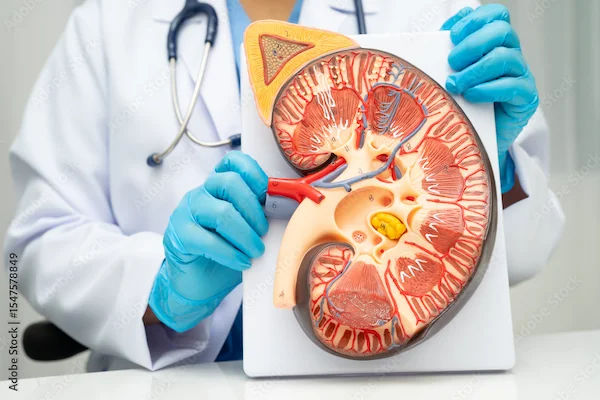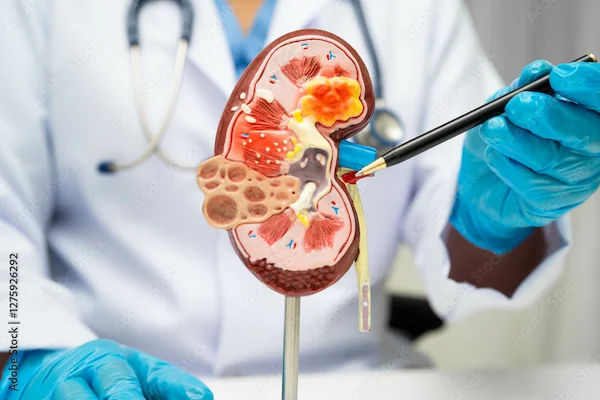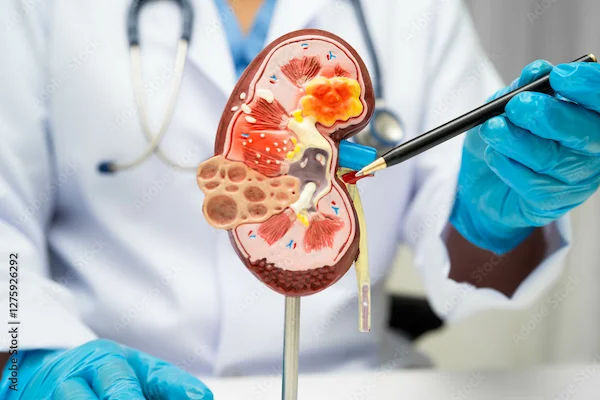What Happens During A Kidney Transplant?
Understand what happens during a kidney transplant, from the surgical procedure to post-operative care. Learn how this life-saving operation restores kidney function and improves quality of life.

Written by
Last updated on 17th Jul, 2025
_13.webp?tr=q-80,f-webp,w-350,dpr-2,c-at_max 700w)
Introduction
A kidney transplant is a life-changing procedure that can significantly improve the quality of life for someone with kidney failure. If you or a loved one is considering a kidney transplant, it’s natural to have questions about what happens before, during, and after the surgery. This article will guide you through the process in a simple and compassionate way.
Understanding Kidney Transplant
A kidney transplant is a surgical procedure where a healthy kidney from a donor (either living or deceased) is placed into a person whose kidneys no longer function properly. The new kidney takes over the work of filtering waste and excess fluids from the blood, eliminating the need for dialysis.
Who Needs a Kidney Transplant?
People with end-stage kidney disease (ESKD) or chronic kidney failure may require a transplant when their kidneys have lost nearly all function. Common causes of kidney failure include:
Diabetes
High blood pressure
Glomerulonephritis (kidney inflammation)
Polycystic kidney disease
Before the Transplant: Evaluation & Preparation
Things to be taken care of before the transplant are:
1. Medical Evaluation
Before being approved for a transplant, you’ll undergo several tests to ensure you’re a suitable candidate. These may include:
Blood tests (to check blood type, infections, and overall health)
Imaging tests (like ultrasound or CT scan)
Heart and lung function tests
Psychological evaluation (to assess emotional readiness)
2. Finding a Donor
A kidney can come from:
Living donor: A family member, friend, or altruistic donor.
Deceased donor: A kidney from someone who has recently passed away.
Living donor transplants often have better outcomes because the kidney is healthier and the waiting time is shorter.
3. Waiting List (If Needed)
If no living donor is available, you’ll be placed on a national waiting list. The wait time depends on factors like blood type, tissue match, and availability.
Consult Top Specialists for Personalised Tips
What Happens During the Transplant Surgery?
Here’s what happens during the surgery:
Step 1: Anaesthesia
You’ll be given general anaesthesia, meaning you’ll be asleep and won’t feel any pain during the procedure.
Step 2: The Surgery
The surgeon makes a small incision in your lower abdomen.
The new kidney is placed inside your body (usually on one side of the pelvis).
The blood vessels of the new kidney are connected to your blood supply.
The ureter (the tube that carries urine) is attached to your bladder.
Your own kidneys are usually left in place unless they’re causing problems like infections.
Step 3: Closing the Incision
The incision is stitched up, and you’re moved to the recovery room.
How Long Does the Surgery Take?
A kidney transplant typically takes 3 to 4 hours, but the entire process (including preparation and recovery) may take longer.
After the Transplant: Recovery & Care
Here’s what happens after the transplant:
1. Hospital Stay (5-7 Days)
You’ll be monitored closely for any complications.
The new kidney may start working immediately or take a few days.
2. Medications (Immunosuppressants)
To prevent your body from rejecting the new kidney, you’ll need to take anti-rejection drugs (immunosuppressants) for life. These medications weaken your immune system, so you’ll need to take extra precautions against infections.
3. Follow-Up Visits
Regular check-ups are crucial to ensure the kidney is functioning well. Blood tests and urine tests will be done frequently.
4. Lifestyle Adjustments
Healthy diet: Low-salt, low-fat, and balanced meals.
Exercise: Light activities like walking help recovery.
Avoid infections: Wash hands frequently, avoid crowds initially.
Potential Risks & Complications
While kidney transplants are generally successful, some risks include:
Rejection: The body may attack the new kidney (managed with medications).
Infections: Due to weakened immunity.
Side effects of medications: Such as weight gain, high blood pressure, or diabetes.
Life After a Kidney Transplant
Most people experience a dramatic improvement in their health after a successful transplant. You’ll have more energy, fewer dietary restrictions, and freedom from dialysis. However, lifelong care is essential to keep the new kidney healthy.
When to Call Your Doctor?
Contact your transplant team if you notice:
Fever or chills
Swelling, pain, or redness near the transplant site
Decreased urine output
High blood pressure
Conclusion
A kidney transplant can be a new lease on life for those suffering from kidney failure. While the process may seem overwhelming, advancements in medical science have made transplants safer and more successful than ever. If you or someone you know is considering a kidney transplant, consult a nephrologist (kidney specialist) to discuss the best options.
Consult Top Nephrologist
Consult Top Specialists for Personalised Tips
Dr Gayatri Pegu
Nephrologist
15 Years • MD (General Medicine) DM(Nephrology)
Guwahati
Apollo Clinic Guwahati, Assam, Guwahati
Dr Ch Sashidhar
Nephrologist
20 Years • MBBS, MD General Medicine, DNB, Nephrology
Secunderabad
Apollo Hospitals Secunderabad, Secunderabad

Dr Praveen Kumar Etta
Nephrologist
10 Years • MBBS,MD DM(SGPGI) FORMER ASST(PIMS)
Hyderabad
Apollo Spectra Ameerpet, Hyderabad

Dr. Pardha Saradhi
Nephrologist
9 Years • MBBS, MD-DNB (Gen. Med.), DNB (Nephro)
Hyderabad
Apollo Hospitals D R D O kanchanbagh, Hyderabad
(50+ Patients)

Dr. Hareesha Babu K
Nephrologist
25 Years • MBBS, MD (General Medicine), DM (Nephrology),FASN, FRCP(Glasg), FRCP (Edin)
Bangalore
Kidney & Hypertension Care, Bangalore
(125+ Patients)
Consult Top Nephrologist
Dr Gayatri Pegu
Nephrologist
15 Years • MD (General Medicine) DM(Nephrology)
Guwahati
Apollo Clinic Guwahati, Assam, Guwahati
Dr Ch Sashidhar
Nephrologist
20 Years • MBBS, MD General Medicine, DNB, Nephrology
Secunderabad
Apollo Hospitals Secunderabad, Secunderabad

Dr Praveen Kumar Etta
Nephrologist
10 Years • MBBS,MD DM(SGPGI) FORMER ASST(PIMS)
Hyderabad
Apollo Spectra Ameerpet, Hyderabad

Dr. Pardha Saradhi
Nephrologist
9 Years • MBBS, MD-DNB (Gen. Med.), DNB (Nephro)
Hyderabad
Apollo Hospitals D R D O kanchanbagh, Hyderabad
(50+ Patients)

Dr. Hareesha Babu K
Nephrologist
25 Years • MBBS, MD (General Medicine), DM (Nephrology),FASN, FRCP(Glasg), FRCP (Edin)
Bangalore
Kidney & Hypertension Care, Bangalore
(125+ Patients)

_4.webp)
_1.webp)

